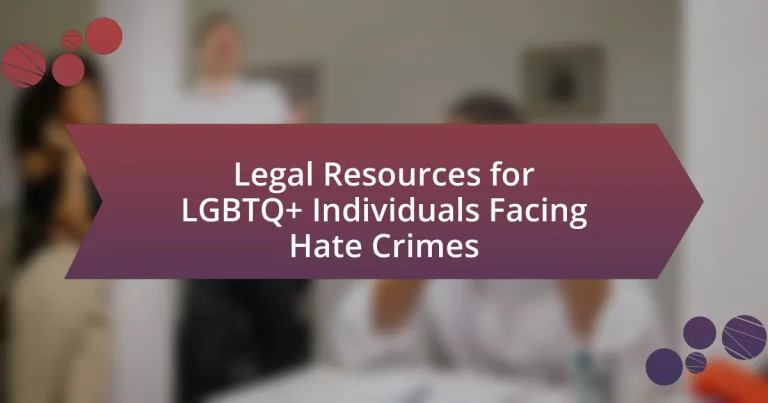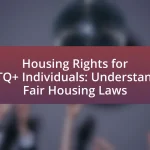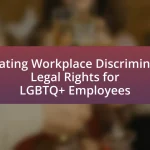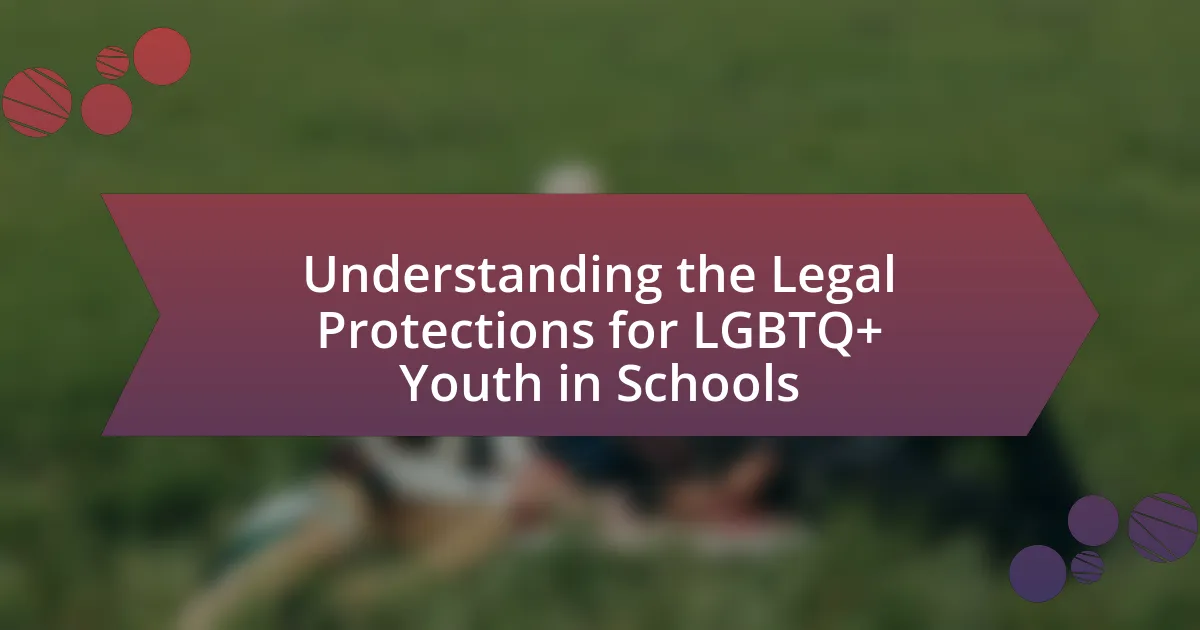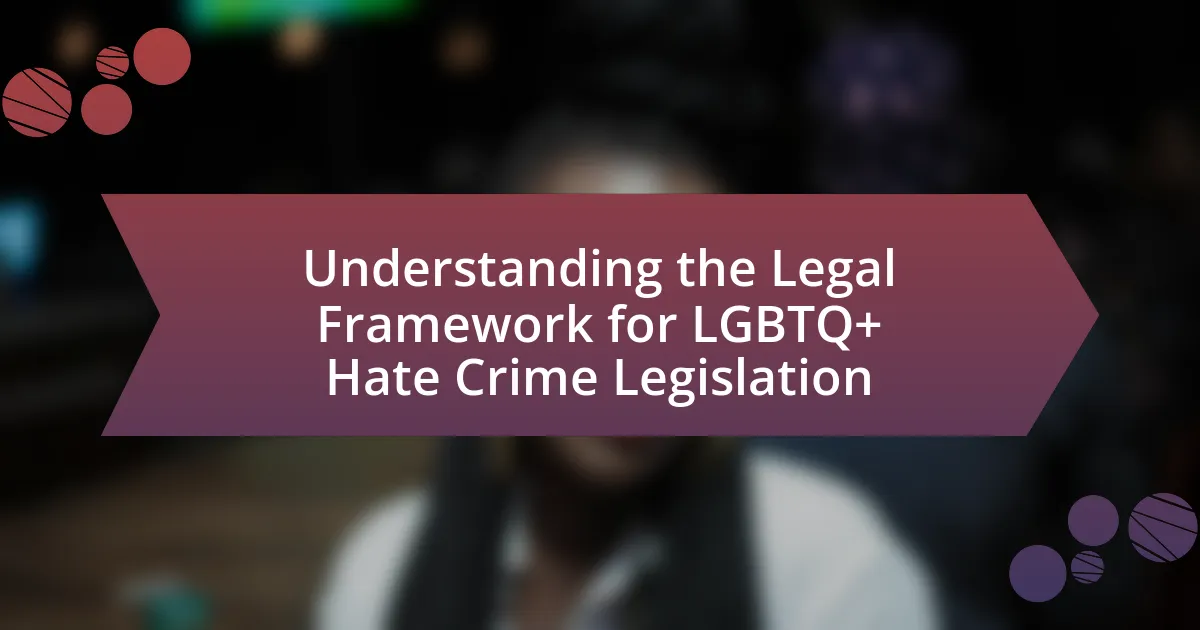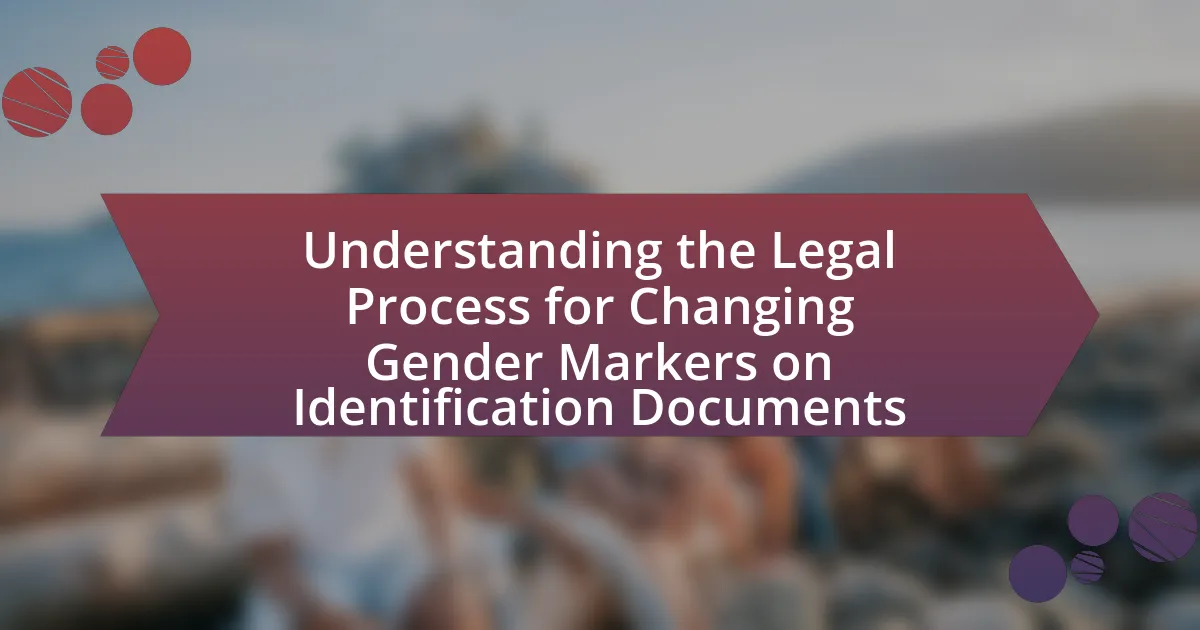Legal resources for LGBTQ+ individuals facing hate crimes are essential for providing support, advocacy, and legal assistance to those disproportionately targeted by such violence. Key organizations, including the National LGBTQ Task Force and the Human Rights Campaign, offer guidance on legal rights and access to specialized attorneys. The article outlines the types of legal assistance available, the importance of tailored resources, and the unique challenges LGBTQ+ individuals encounter in reporting hate crimes. It also discusses the legal protections in place, the role of advocacy organizations, and the steps victims should take to ensure their safety and seek justice effectively.

What are Legal Resources for LGBTQ+ Individuals Facing Hate Crimes?
Legal resources for LGBTQ+ individuals facing hate crimes include organizations that provide legal assistance, advocacy, and support. Notable resources are the National LGBTQ Task Force, which offers legal guidance and advocacy, and the Human Rights Campaign, which provides information on legal rights and resources. Additionally, local LGBTQ+ centers often have legal aid programs or can refer individuals to attorneys specializing in hate crime cases. According to the FBI’s Hate Crime Statistics report, LGBTQ+ individuals are disproportionately targeted, highlighting the importance of these legal resources in addressing and combating hate crimes effectively.
How do these resources support LGBTQ+ individuals?
Legal resources for LGBTQ+ individuals facing hate crimes provide essential support through legal representation, advocacy, and access to information about rights. These resources help individuals navigate the legal system, ensuring they can report hate crimes and seek justice effectively. For instance, organizations like the Human Rights Campaign and the National Center for Lesbian Rights offer legal assistance and guidance, which is crucial given that LGBTQ+ individuals are disproportionately affected by hate crimes, with a reported 20% of hate crime victims identifying as LGBTQ+ according to the FBI’s Hate Crime Statistics report. This legal support empowers LGBTQ+ individuals to assert their rights and seek protection under the law.
What types of legal assistance are available?
Various types of legal assistance are available for LGBTQ+ individuals facing hate crimes, including legal representation, advocacy services, and hotlines. Legal representation can be provided by attorneys specializing in civil rights or hate crime cases, ensuring that victims receive proper guidance and support throughout the legal process. Advocacy services often involve organizations that offer resources, support, and assistance in navigating the legal system, such as the Human Rights Campaign and the National Center for Lesbian Rights. Additionally, hotlines like the LGBTQ+ National Help Center provide immediate support and can connect individuals with legal resources tailored to their specific needs. These forms of assistance are crucial in helping victims understand their rights and pursue justice effectively.
How can legal resources help in reporting hate crimes?
Legal resources can assist in reporting hate crimes by providing individuals with the necessary legal guidance, support, and advocacy to navigate the reporting process effectively. These resources often include access to legal aid organizations, which can help victims understand their rights, gather evidence, and file reports with law enforcement. For instance, organizations like the National Center for Lesbian Rights offer resources specifically tailored for LGBTQ+ individuals, ensuring they receive appropriate support when reporting incidents. Furthermore, legal resources can facilitate connections to local law enforcement agencies that are trained to handle hate crimes sensitively, thereby increasing the likelihood of proper documentation and investigation.
Why is it important to have legal resources specifically for LGBTQ+ individuals?
Legal resources specifically for LGBTQ+ individuals are crucial because they provide tailored support to navigate unique legal challenges and discrimination faced by this community. LGBTQ+ individuals often encounter specific legal issues related to hate crimes, discrimination in employment, housing, and healthcare, which necessitate specialized legal knowledge and advocacy. For instance, the FBI reported that in 2020, 20.5% of hate crime incidents were motivated by sexual orientation bias, highlighting the need for legal resources that understand the nuances of these cases. Access to knowledgeable legal support can empower LGBTQ+ individuals to assert their rights, seek justice, and ensure their safety in a society where they may be disproportionately targeted.
What unique challenges do LGBTQ+ individuals face in hate crime situations?
LGBTQ+ individuals face unique challenges in hate crime situations, primarily due to societal stigma and discrimination. These challenges include underreporting of incidents, as victims may fear further victimization or lack trust in law enforcement. According to the FBI’s Hate Crime Statistics report, LGBTQ+ individuals are disproportionately targeted, with 20.4% of hate crimes motivated by sexual orientation bias in 2020. Additionally, the intersectionality of race, gender identity, and sexual orientation can compound the risks and barriers faced by LGBTQ+ individuals, making them more vulnerable to violence and less likely to seek legal recourse. This context highlights the urgent need for tailored legal resources and support systems to address these specific challenges effectively.
How do societal attitudes impact the need for these resources?
Societal attitudes significantly influence the need for legal resources for LGBTQ+ individuals facing hate crimes. When societal attitudes are predominantly negative or discriminatory towards LGBTQ+ individuals, the incidence of hate crimes tends to increase, creating a heightened demand for legal support and resources. For instance, a study by the FBI reported that hate crimes against LGBTQ+ individuals rose by 20% from 2019 to 2020, reflecting the impact of societal prejudice. This increase necessitates accessible legal resources to help victims navigate the justice system, seek protection, and obtain justice. Conversely, positive societal attitudes can lead to a decrease in hate crimes, thereby reducing the immediate need for such resources.

What types of legal protections exist for LGBTQ+ individuals facing hate crimes?
LGBTQ+ individuals facing hate crimes are protected by various legal frameworks, including federal, state, and local laws. The federal Hate Crimes Prevention Act of 2009 expands the definition of hate crimes to include those motivated by sexual orientation and gender identity, allowing for federal prosecution and resources for victims. Additionally, many states have enacted their own hate crime laws that specifically include protections for LGBTQ+ individuals, with varying degrees of penalties for offenders. Local jurisdictions may also have ordinances that provide additional protections and resources for victims. These legal protections aim to deter hate crimes and ensure that LGBTQ+ individuals have access to justice and support when targeted due to their identity.
How do hate crime laws vary by jurisdiction?
Hate crime laws vary significantly by jurisdiction, with differences in definitions, protected characteristics, and penalties. For instance, some jurisdictions include sexual orientation and gender identity as protected categories, while others may not. According to the FBI’s Hate Crime Statistics report, as of 2020, 47 states and the District of Columbia have hate crime laws, but the specifics of these laws can differ widely; for example, California’s law explicitly includes protections for LGBTQ+ individuals, whereas other states may have more limited definitions. Additionally, penalties for hate crimes can range from enhanced sentencing to specific fines, depending on the jurisdiction’s legal framework.
What are the key components of hate crime legislation?
The key components of hate crime legislation include the definition of hate crimes, enhanced penalties for offenses motivated by bias, and provisions for reporting and tracking hate crimes. Hate crime legislation typically defines hate crimes as criminal acts motivated by prejudice against particular characteristics, such as race, ethnicity, religion, sexual orientation, or gender identity. Enhanced penalties serve to impose stricter sentences on offenders whose actions are driven by such biases, reflecting the severity of the impact on victims and communities. Additionally, effective hate crime legislation often includes mechanisms for law enforcement to report and track incidents, which aids in understanding the prevalence of hate crimes and informs policy responses. For instance, the FBI’s Hate Crime Statistics Act mandates the collection of data on hate crimes, providing a factual basis for assessing the issue.
How can individuals find out about local hate crime laws?
Individuals can find out about local hate crime laws by consulting state and local government websites, which typically provide detailed information on applicable laws. Many jurisdictions have specific sections dedicated to hate crimes within their criminal codes, and these resources often include definitions, penalties, and reporting procedures. Additionally, organizations such as the American Civil Liberties Union (ACLU) and the Human Rights Campaign offer guides and resources that summarize hate crime laws by state, making it easier for individuals to understand their rights and protections.
What role do advocacy organizations play in providing legal resources?
Advocacy organizations play a crucial role in providing legal resources by offering support, education, and access to legal representation for individuals facing discrimination and hate crimes. These organizations often develop legal guides, conduct workshops, and provide referrals to attorneys who specialize in LGBTQ+ rights, ensuring that affected individuals understand their rights and available legal options. For instance, organizations like the Human Rights Campaign and Lambda Legal have established legal hotlines and resources that empower LGBTQ+ individuals to navigate the legal system effectively. This support is vital, as studies indicate that LGBTQ+ individuals are disproportionately affected by hate crimes, highlighting the need for accessible legal assistance to address these issues.
Which organizations are dedicated to supporting LGBTQ+ individuals?
Organizations dedicated to supporting LGBTQ+ individuals include the Human Rights Campaign, GLAAD, and the Trevor Project. The Human Rights Campaign advocates for LGBTQ+ equality and provides resources for legal support and education. GLAAD focuses on media representation and works to promote understanding and acceptance of LGBTQ+ people. The Trevor Project offers crisis intervention and suicide prevention services specifically for LGBTQ+ youth. These organizations play a crucial role in providing legal resources and support to individuals facing hate crimes, contributing to the overall safety and well-being of the LGBTQ+ community.
How can these organizations assist in legal matters?
Organizations that focus on legal resources for LGBTQ+ individuals facing hate crimes can assist by providing legal representation, advocacy, and education on rights. These organizations often employ attorneys who specialize in hate crime legislation and can guide victims through the legal process, ensuring their rights are protected. For example, the Human Rights Campaign offers resources and referrals to legal professionals experienced in handling hate crime cases, which can significantly improve the chances of a successful outcome. Additionally, these organizations may conduct workshops and distribute materials that inform individuals about their legal rights and available protections under local and federal laws, thereby empowering victims to take action.

What steps should LGBTQ+ individuals take if they experience a hate crime?
LGBTQ+ individuals who experience a hate crime should first ensure their immediate safety and seek medical attention if necessary. Following this, they should report the incident to law enforcement, providing as much detail as possible, including any evidence or witnesses. It is also crucial to document the incident by taking photographs of injuries or property damage and keeping a record of any related communications. Additionally, contacting local LGBTQ+ advocacy organizations can provide support and resources, including legal assistance. According to the FBI’s Hate Crime Statistics report, hate crimes against LGBTQ+ individuals have been on the rise, highlighting the importance of reporting these incidents to help combat this trend.
How can victims effectively document their experiences?
Victims can effectively document their experiences by maintaining a detailed record of incidents, including dates, times, locations, and descriptions of events. This documentation should also include any witnesses’ names, photographs of injuries or property damage, and copies of any relevant communications, such as emails or text messages. Research indicates that thorough documentation can significantly strengthen legal cases, as evidenced by a study published in the Journal of Interpersonal Violence, which found that victims who provided detailed accounts were more likely to receive favorable outcomes in court.
What information is crucial to collect after a hate crime incident?
After a hate crime incident, it is crucial to collect detailed information including the date, time, and location of the incident, descriptions of the perpetrator(s), any witnesses present, and a record of the specific actions or words that constituted the hate crime. This information is essential for law enforcement and legal proceedings, as it helps establish the context and severity of the crime. Accurate documentation can also support potential civil claims and assist in community awareness efforts, as evidenced by studies showing that thorough reporting increases the likelihood of successful prosecution in hate crime cases.
How can victims ensure their safety while seeking help?
Victims can ensure their safety while seeking help by utilizing confidential support services and establishing a safety plan. Confidential support services, such as hotlines and shelters specifically designed for LGBTQ+ individuals, provide a safe space to discuss their situation without fear of exposure. Establishing a safety plan involves identifying safe locations, trusted individuals to contact, and strategies for leaving dangerous situations quickly. According to the National Coalition of Anti-Violence Programs, 70% of LGBTQ+ hate crime victims reported feeling safer when they accessed specialized support services, highlighting the effectiveness of these resources in enhancing personal safety.
What are the best practices for accessing legal resources?
The best practices for accessing legal resources include utilizing reputable legal aid organizations, consulting with specialized attorneys, and leveraging online legal databases. Legal aid organizations, such as the National LGBTQ Task Force, provide resources tailored to the needs of LGBTQ+ individuals, ensuring access to knowledgeable legal support. Specialized attorneys with experience in hate crime cases can offer personalized guidance and representation, which is crucial for navigating complex legal systems. Additionally, online legal databases like Westlaw and LexisNexis offer comprehensive legal information and case law, enabling individuals to research relevant laws and precedents effectively. These practices enhance the ability of LGBTQ+ individuals facing hate crimes to secure the legal assistance they require.
How can individuals find qualified legal representation?
Individuals can find qualified legal representation by utilizing local bar association referral services, which connect clients with attorneys specializing in specific areas of law. These services often provide vetted lists of lawyers who have experience in handling cases relevant to LGBTQ+ individuals facing hate crimes. Additionally, organizations such as the National LGBTQ+ Bar Association offer resources and directories to help individuals locate attorneys who are knowledgeable about LGBTQ+ rights and issues. Research indicates that accessing these specialized resources increases the likelihood of finding competent legal representation tailored to the unique challenges faced by LGBTQ+ individuals.
What should individuals expect during the legal process?
Individuals should expect a structured series of steps during the legal process, including filing a complaint, investigation, potential mediation, and court proceedings. Initially, individuals will file a formal complaint with law enforcement or a relevant agency, which will trigger an investigation into the alleged hate crime. Following this, there may be opportunities for mediation to resolve the issue without going to court. If mediation is unsuccessful or not pursued, the case may proceed to court, where evidence will be presented, and a judgment will be made. Throughout this process, individuals can expect to engage with legal professionals who can provide guidance and support, ensuring their rights are protected. This structured approach is designed to uphold justice and provide a clear pathway for addressing hate crimes, as outlined in legal frameworks that protect against discrimination and violence.
What additional support systems are available for LGBTQ+ individuals after a hate crime?
LGBTQ+ individuals have access to various support systems after experiencing a hate crime, including crisis hotlines, counseling services, legal aid organizations, and community support groups. Crisis hotlines, such as the National LGBTQ+ Hotline, provide immediate emotional support and resources. Counseling services, often offered by LGBTQ+ community centers, help individuals process trauma and navigate their feelings. Legal aid organizations, like the Lambda Legal Defense and Education Fund, offer legal assistance and advocacy for victims of hate crimes. Additionally, community support groups foster a sense of belonging and provide peer support, which is crucial for recovery. These systems collectively aim to address the emotional, legal, and social needs of LGBTQ+ individuals affected by hate crimes.
How can mental health resources complement legal support?
Mental health resources can complement legal support by providing emotional and psychological assistance to individuals navigating the legal system, particularly in sensitive cases such as hate crimes against LGBTQ+ individuals. These resources help clients cope with trauma, reduce anxiety, and improve their overall well-being, which can enhance their ability to engage effectively with legal processes. Research indicates that individuals who receive mental health support during legal proceedings report higher levels of satisfaction and better outcomes, as they are more equipped to articulate their experiences and needs. For instance, a study published in the Journal of Interpersonal Violence found that victims of hate crimes who accessed mental health services demonstrated improved resilience and a greater capacity to participate in legal actions.
What community resources can aid in recovery and advocacy?
Community resources that can aid in recovery and advocacy for LGBTQ+ individuals facing hate crimes include local LGBTQ+ centers, legal aid organizations, and mental health services. Local LGBTQ+ centers often provide support groups, counseling, and resources tailored to the needs of the community, fostering a safe environment for healing. Legal aid organizations offer assistance with navigating the legal system, including reporting hate crimes and accessing victim services. Mental health services, including therapy and crisis intervention, are crucial for addressing the psychological impact of hate crimes. According to the Human Rights Campaign, access to these resources significantly improves recovery outcomes and empowers individuals to advocate for their rights.
